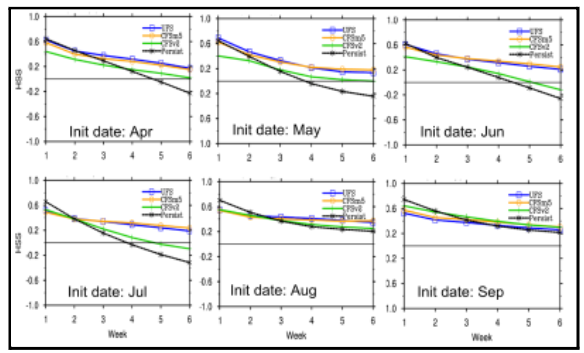A New Arctic Sea Ice Prediction System with the FV3-Based Unified Forecast System
January 15, 2022
Development of a new sea ice prediction system based on the Unified Forecast System (UFS) atmosphere-ocean-sea ice coupled system, an OSTI-funded project at the NOAA Climate Prediction Center (CPC) has seen promising results over the past year.
Over the past two years, CPC scientists have been working on transitioning their current experimental sea ice prediction system from the Climate Forecast System with MOM5 framework (CFSm5) to the new Finite-Volume Cubed-Sphere Dynamical Core (FV3) -based coupled UFS. An FV3-based coupled UFS, that will be the basis of the Global Ensemble Forecast System Version 13 (GEFSv13), the next operational ensemble system, is currently under development by the UFS-R2O Project. While the new model is under development, CPC scientists took advantage of multiple prototype versions available in the interim in order to develop and test the new sea ice prediction system. The results from the prototypes are encouraging in that forecast skill is as good or better than the existing system in most cases and forecasts are generally improved for the melt season. The project also conducted 9 months-long seasonal integrations, where the skill is superior to the current operation seasonal prediction system Climate Forecast System Version 2 (CFSv2).

Sea ice Heidke Skill Scores for 2012-2020 for initializations for April through September. UFS prototype-5 skills are as good or better than the existing systems in most cases.
With these encouraging results, the project continues on to FY22, with an eventual goal of providing improved real-time forecasts with the FV3-UFS similar to the current sea ice outlooks. An improved sea ice prediction system will greatly benefit a number of stakeholders such as the NWS Alaska Region that provides forecast guidance to the Department of the Interior (DOI) and the United States Coast Guard (USCG), and the Alaska Center for Climate Assessment and Policy that issues Alaska Region Climate Outlooks.
Within the UFS framework, this project has demonstrated the importance of ongoing collaboration between forecasters and model developers. In this project, the CPC forecasters have been actively engaged in the testing and evaluation of the prototypes ensuring that specific forecasting challenges are adequately addressed well ahead of operational implementation.
For more information on this project please watch the team’s presentation in the Weeks 3-4/S2S Webinar series or contact the Project Manager Wanqiu Wang at Wanqiu.Wang@noaa.gov.

